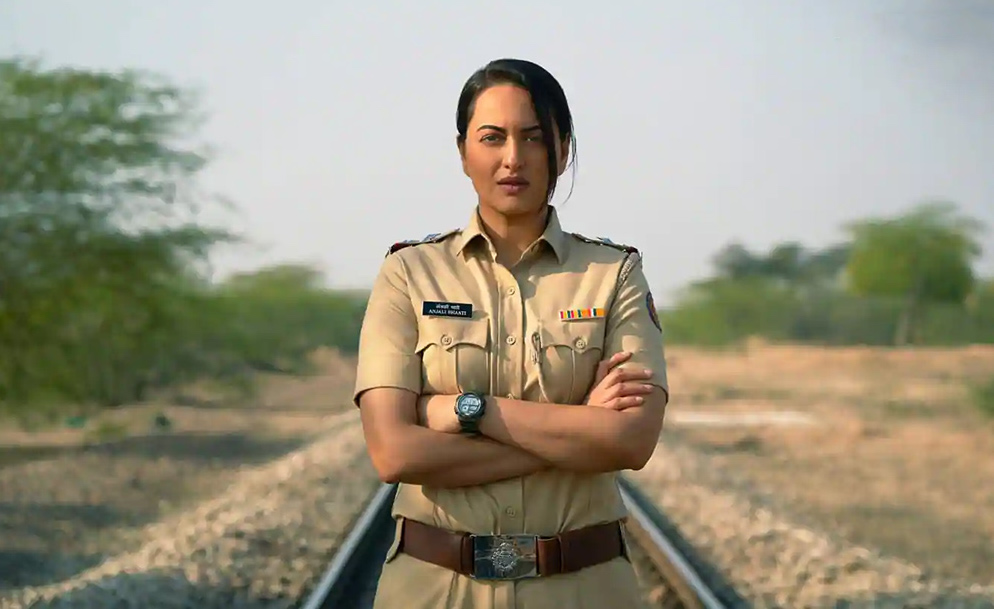Dahaad, an eight-episode web series directed by Reema Kagti and Ruchika Oberoi, is a police procedural drama centering on the hunt of a serial killer of several women. The series, which premiered at the Berlin International Film Festival earlier this year, is currently streaming on Amazon Prime. It is layered, nuanced and makes for riveting viewing overall.
The series, created by Kagti and Zoya Akhtar, unfolds in a small town in Rajasthan’s Jhunjhunu district. Anjali Bhaati (Sonakshi Sinha), a sub-inspector at the Mandawa police station, comes across the case of the disappearance of a twenty-eight-year-old woman, who had eloped from her home with her lover. Forty-eight days have passed, and she has not contacted her family. Her brother, who has been making rounds of the police station, has yet to receive any help from the police to locate her missing sister. As she begins her investigation, it is revealed that a serial killer is on the loose linking to many missing women in the past. Along with the support of her seniors, SHO Devi Lal Singh (Gulshan Devaiah) and SI Kailash Parghi (Sohum Shah), Bhaati embarks upon a journey that reveals how the deep-seated misogyny, patriarchy, subjugation and casteism have made twenty-seven women, belonging to the lower rung of society, victims of the killer’s lust…
With its realistic setting and intricate well-fleshed out characters, Dahaad unfolds at a languid pace, paying more attention to the minutiae of characterization rather than sudden plot revelations. The episodes are layered and get into the minds of the police officers as they attempt to catch a deadly serial killer. Each of the three police officers – Anjali, Devi, and Kailash – is also burdened by personal battles they have to confront with their family. Anjali’s mother is after her to get married and settle down; Devi’s wife is suspecting him of having an affair with Anjali; and Kailash is not yet prepared to become a father. Even Anand Swarnakar (Vijay Varma), the psychopath, is taunted by his father every time he meets him even as his wife is having an affair with her colleague. These traits make these characters relatable and therefore it is easier for us to engage with them and .even empathize with them when needed.
The writer trio of Kagti, Ritesh Shah, and Zoya Akhtar maintain a taut narrative line through the series without resorting to undue melodrama and retaining a firm filmic grip on the central idea. Scenes such as Anjali showing her mother the photographs of the dead girl and arguing why it is wrong to pressurize a girl to get married or Devi in a fit of rage calling his wife a backward woman never appear to be exaggerated or sugar coated with sentimentalism. These scenes, in fact, give importance to the supporting characters and add multiple layers of complexity to the dramatic situations. The modest routine lives of the characters are explored as an unfiltered mirror of complex moralities in a contemporary society that still lives under the constant fear of losing honor and being judged by others. Though this is a series about a serial killer, the directors do not let the scenes border on exploitation or use graphic depictions of violence to make their point.
That said, after the extremely satisfying first six episodes, the last two are relatively weaker. The series loses steam as the hunt for Anand by the entire Rajasthan police lacks engagement. While the makers have tried not to follow the conventional strategy to let us know the reason behind the serial killer’s murderous spree, this tried and tested method could have actually worked in favour of the narrative, adding more depth to it. Instead, the final scene between a triumphant Anjali and an imprisoned Anand ends on an almost obtuse note. Amongst other glitches, there is absolutely no buildup leading to Anjali changing her surname from Bhaati to Meghwal. The character of a politician named Mahipal, who gets introduced in the beginning of the series and appears to be a key factor in the story, just vanishes in subsequent episodes. Even the concerns of the makers on some of the social issues raised in the early episodes appear to to be little more than lip service by now and end up forcibly rather than organically moving the story forward.
Tanay Satam’s moody cinematography expertly captures the parched exteriors and claustrophobic interiors, bringing out a strong synthesis between the setting and its inhabitants. Anand Subaya’s editing deftly ensures the narrative is unhurried and slow burns its way to its culmination while keeping us engaged throughout. The sound design by Niraj Gera and background score by Gaurav Raina and Tarana Marwah work well in tandem to create an effective soundscape for the series. Shailaija Sharma’s detailed production design is another asset.
The performance of the four central characters – Sonakshi Sinha, Vijay Varma, Sohum Shah, and Gulshan Devaiah – are all spot on, lifting the series a notch or two. Sinha embodies her role with silent rage while Varma brings to life inherently dark character who is both bewitching as well as abhorrent. Shah ensures us having empathy for his character even as Devaiah brings much intricacy to his character. The supporting actors – Zoa Morani, Jayati Bhatia, Shruti Vyas, and Sanghmitra Hitaishi amongst others – all depict their characters with a great deal of believability and sensitivity.
Dahaad is arguably one of the best web series to come out of India. With the OTT platforms suffering from an overdose of crime thrillers, the makers must be commended for making the series stand out. By and large, Dahaad roars convincingly and how!
Hindi, Thriller, Drama, Color


